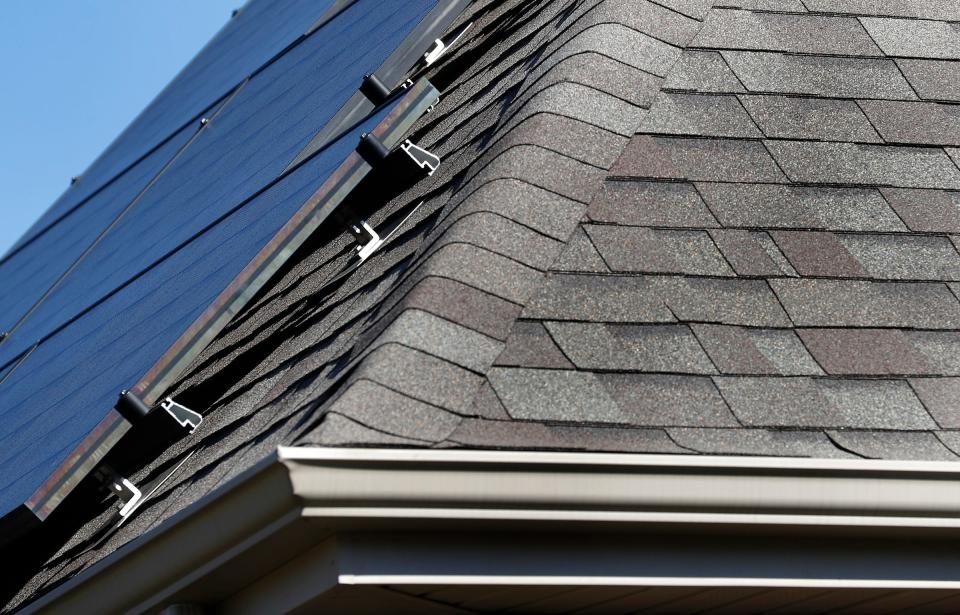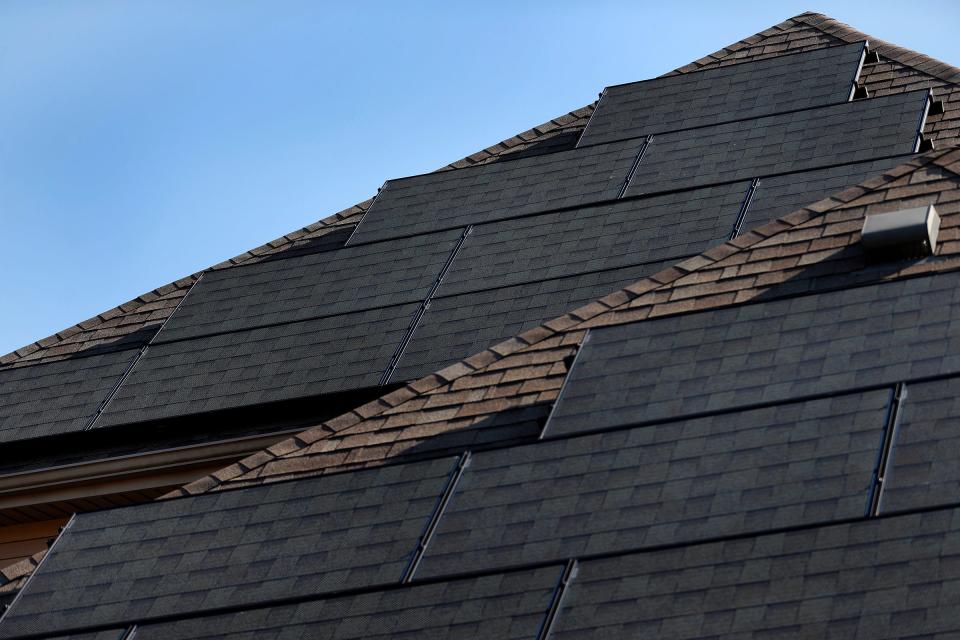Scrub Hub: Solar scammers want your money. How do I spot and avoid them?
Solar power is booming all across the country, including right here in Indiana. Companies such as Cummins and Eli Lilly want to cut their carbon footprint. Utilities are retiring coal plants and replacing them with renewables.
But this increase isn’t happening only at that large scale. Homeowners want solar, too. They want to cut back on their electricity bills and they want to use clean energy.
That interest has really come to a head in the last two years. During the pandemic, many families were at home using more electricity and were looking to cover some of that with solar.
Scrub Hub: The spongy moth is 'devastating' forests across U.S. and it's coming to Indiana
In that time, the state’s net metering program — which gave solar owners a credit for energy they sent back to the grid — also was fading out. All this created a mad rush, said Zach Schalk, the Indiana program director for Solar United Neighbors.
The highly charged atmosphere also created the perfect environment for solar scams.
“Unfortunately, I would say this is something in my mind that really exploded in the COVID era,” he said.
That’s why, for this edition of the Scrub Hub, we will be unpacking solar scams. We will be answering the questions: What are they? And how do you spot them?
We spoke with Schalk and looked at a few different resources, such as the Better Business Bureau, to bring Hoosiers everything they need to know about these scams.
Short Answer: What is a solar scam?
So what is a solar scam, anyway? The most common way these scams present themselves is on the financial side of things, Schalk said.
Companies were taking advantage of the uncertainty around the end of net metering and what the new rates for rooftop solar customers would be.
“Leading up to the net metering deadline, a lot of people were trying to get solar. So if there were ads everywhere or people coming to your door, that was the easiest solution,” Schalk said. “There was a sense of urgency, so people just ran with it.”

With promises of low-cost or even no-cost solar installation, many companies hook homeowners to get them through the door — particularly targeting low- and middle-income Hoosiers. Once there, solar installers “funnel people toward their financing products, which are typically well-above market rates,” Schalk said.
In Indiana, the cost of residential solar right now is about $2 to $3 per watt. But with these companies’ financing products and additional fees, that cost is ballooning to as much as $5 or more for each watt, according to Schalk.
“Then Hoosiers get locked into this contract,” he said. “So not only do homeowners still have their energy bill, but then they have a monthly payment that might be higher than the energy bill.”
The Better Business Bureau has recently issued a scam alert warning people against solar scams. The Bureau said that representatives offering “free solar panels” could actually “cost you big time.”
Sometimes the companies will also ask for a payment to cover upfront costs, the BBB warned, assuring the homeowners they will be reimbursed by a government program that doesn’t exist.

While the financing part is the most widespread thing that gets most people, there also are well-documented cases of scammers being after personal information or people getting poor quality installation and safety concerns with the panels.
Both the financing and installation problems can be seen with a company called Pink Energy, formerly known as Power Homes Solar. The BBB has received more than 1,500 complaints against the company in the last three years and several states are investigating Pink Energy, which shuttered its doors late last month after eight years.
Customers were locked into expensive financing contracts paying for solar panels that were failing to function and produce energy as promised.
Long Answer: How do I spot and avoid the scams?
These scams can present themselves in a variety of different ways. There will be a lot of postings and ads online and in social media for various deals — many of which ask you to put in some contact and personal information to get more details.
Other methods include through phone calls and even in-person as representatives go knocking door-to-door. Schalk said his neighborhood has been blanketed with companies doing just that — even his door was knocked on, despite having visible solar panels already on his roof.
Regardless of the method, Schalk said there are several red flags that can help homeowners spot these scams.
The first that he warns against is ads that don’t have any specific company name or branding. If it’s just very generic and promises great solar deals, he said that is the best indication of a lead generator. That’s where you put your information in for companies to reach out to you and try to sell you on a solar installation.

Schalk also warns against any posts and ads that talk about companies having a special program or partnership with your utility. Here in Indiana, he said there are no special programs or partnerships offered by utilities for solar.
So anything that talks about that sort of program or something that is available “only in your community” is not accurate. All of that is to create a sense of urgency and pressure.
That’s another warning sign to watch out for, Schalk said. Anything that feels overly aggressive or pushy to make a decision right there on the spot is not the way it should be. Companies will try to do that by saying a certain offer is available for only a limited time, or they will offer only one option.
“They present the financing option as the default,” Schalk said, so if you don’t know what to ask for then you won’t be able to find the alternatives.
That can make people hurry into a decision without doing more research or assuming there isn’t a better choice.
Which brings Schalk to one of his last things to watch out for: pie-in-the-sky offers. That includes things like no money down, low-cost installation or even installing for free — all of those things are used to hook homeowners, but are misrepresenting how it will work.
“Anything, if it sounds too good to be true,” Schalk said, “it probably is.”
Farming the sun: Can solar panels and row crops coexist on farmland across the skeptical Corn Belt?
Beyond being able to spot these scams, there are also steps homeowners can take to avoid being the victim of one of them.
The BBB recommends doing your research. Genuine incentive programs and reputable solar companies and contractors do exist, so before accepting an unsolicited offer, investigate the company’s reputation and explore the companies in your area.
They also tell homeowners to stay strong and don’t give in to high-pressure sales tactics. The companies will push and be very persistent until they can get a decision — but Schalk said homeowners shouldn’t rush and should take the time they need, as this is a big decision.
The BBB also suggests homeowners get competing bids. They recommend contacting several solar installers in the area and get bids from each company — that will help spot the legitimate companies and offers from those that aren’t. Schalk also suggests getting the offers in writing.
And lastly, Schalk’s biggest suggestion is to ask a lot of questions. Ask about any aspect of the proposal or contract you don’t understand — if they don’t answer or get upset at the question, consider it a red flag. Schalk also suggests asking about an estimated return on investment and how they are projecting the value of the system.

Solar United Neighbors is also a resource that all homeowners should feel welcome to use, Schalk said. Reach out and call them for free, even if you aren’t working with or through the organization.
The group also has a whole page on its website dedicated to different types of financing options, which can include a home equity line of credit or other secured loan. Financing with the installer can work well for some, Schalk said, but it’s all about understanding the options.
“I always advise taking a step back, getting additional quotes and asking questions,” he said. “Don’t assume one option is the only option.”
Call IndyStar reporter Sarah Bowman at 317-444-6129 or email at sarah.bowman@indystar.com. Follow her on Twitter and Facebook: @IndyStarSarah. Connect with IndyStar’s environmental reporters: Join The Scrub on Facebook.
IndyStar's environmental reporting project is made possible through the generous support of the nonprofit Nina Mason Pulliam Charitable Trust.
This article originally appeared on Indianapolis Star: Solar power energy scams have erupted in Indiana. How to spot, avoid

